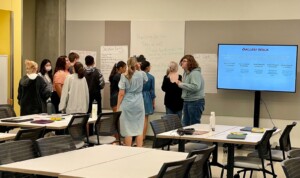So far to go on the new edu-employment bargain
DC Chancellor Rhee is still getting beat up for a 5% layoff that partially considered performance. As she explained in a thoughtful note to staff:
When we learned of the shortfall and realized that some school positions would be cut, according to DC law for a reduction in force, we used school needs, principal-rated performance and contributions of staff, supplemental professional experiences, such as training, as demonstrated on the job, and seniority to decide which positions and staff would be cut from school budgets.
Here’s my favorite question, “some have suggested that principals should not be allowed to rate their own school needs and staff members.” Can you imagine suggesting that your boss not rate your performance? Again, here’s Michele’s thoughtful response:
To hold principals accountable for results in student growth, and then tie their hands regarding the staffing decisions that impact those results, is neither sound management nor a commonsense approach to raising student achievement levels.
We have so far to go to create the new education employment bargain. As another thoughtful big city leader says frequently, “if the best day of a teacher’s life is the day she retires, there’s something wrong.” And, “if we pay for degrees, credits, and years on the job and provide a pension incomparable to anything in the private sector, the system won’t work.”
Some foundations are taking on the challenge of teacher effectiveness—it’s so much more than training, it’s systems transformation:
- a great opening offer: attractive salary, conditions and competent leadership
- a supportive and collaborative environment that provides rich grade-level team, online peer-to-peer, and whole-school learning experiences
- an assessment and data platform that provides useful and timely information to guide instruction
- teaching as a tryout: a winnowing based on demonstrated value-add and potential for continued improvement (we talk only about retention, but the focus should be on retaining the best teachers and non-renewing the weakest 10-20%)
- a chance for rapid advancement with proven performance and demonstrated willingness to take on additional responsibility (i.e., full year contract)
- teaching as a public act with frequent feedback from a variety of observers
And with the whole system (at least secondary) transitioning to blends of online and onsite learning, early career opportunities to teach online to identify interest and competence would be a good addition.
Federal grants are pushing for a new performance-based employment bargain. The skirmish in DC over partial use of performance is just the beginning. With the President, the Department, the foundation, and most Democratic think tanks on the performance bus, the unions are alone (with the politicians they own) protecting the old years, credit, and tenure bargain. We have so far to go…but there’s no going back.







0 Comments
Leave a Comment
Your email address will not be published. All fields are required.